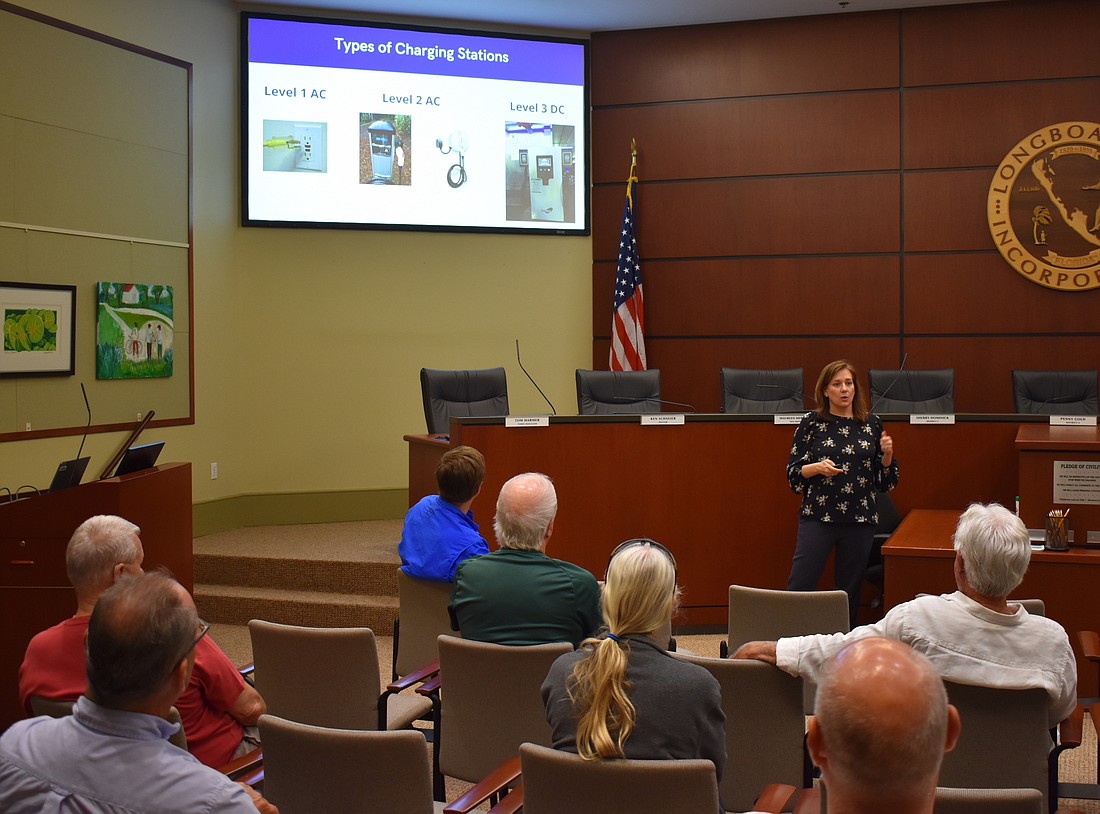- November 17, 2024
-
-
Loading

Loading

About 20 car enthusiasts gathered in Longboat Key Town Hall the other day to talk about, well, cars.
An Audi owner was there.
So was a gentleman who just bought a Ford Mustang.
Several fans of Elon Musk’s sporty creations. Even a boat.
Many of the rest of the folks gathered in the space normally reserved for town commissioners or municipal advisory boards also owned something cool, but everyone on hand was there to learn.
Only there was no chatter about handling, horsepower or how many speeding tickets drivers had chalked up.
There was, however, plenty of discussion about kilowatt hours, amps, charging times.
Sara Kane, Sarasota County’s sustainability program supervisor, was in town with her traveling presentation, "Electric Avenue: Supporting Electric Vehicles in Sarasota County."
Here are some answers to some questions raised:
In a word, yes.
In addition to the county’s 18 free-to-use charging stations with 30 access points, Sarasota County also operates a 2019 Chevrolet Volt electric vehicle. Kane said she wanted to bring it with her on her visit to Longboat Key, but it’s a popular ride in the county’s motor pool, and it was already checked out by another user. The sedan offers about 230 miles of range and is used by a range of county employees for day to day chores.
Yes. The town of Longboat Key offers one EV charging station at Bayfront Park. The NovaCharge NC5025 non-networked, single-port, Level 2 charging station can accommodate one car at a time, but it is free. A Sarasota County grant covered $2,734 of the approximate $5,500 it took to install the Bayfront Park charger in 2017.
Based on the 2022 Citizen Survey, we know something about their ownership habits and their hopes.
A few examples of questions and answers:
Do you currently own an electric vehicle?
If charging stations were available, would you plan on purchasing or leasing an electric vehicle in the next five years?
Are there currently charging stations or outlets for electric vehicles available in your home or residential community/complex?
Is access to convenient charging stations or outlets a concern that might prevent you from purchasing an electric vehicle?
Based on the discussion at the workshop, most agreed an electric car on Longboat makes sense for local trips and many said they charge their vehicles just a few times a month, often at home-based charging stations. The island is home to a public at Bayfront Park, and a few at private locations that are open to the public. Some condominium communities are heading in that direction, but technical details and costs are often impediments. Town officials last year discussed the potential of installing more stations on the island, but there was concern about the costs being passed on to the public at some point. The town would have been responsible for the estimated $180-$240 a month for the cost of electricity and the total operating costs of about $17,000 during the seven-year stretch. The cost to purchase the chargers after the seven-year term would have been between $35,000-$55,000, plus between $2,000-$4,000 in annual maintenance. State law provides a condo association cannot prohibit an owner from installing a charging station within the boundaries of the owner’s limited common element parking area.
But some condos do not consider parking spaces as common elements. Plus, the condo owner has to pay for installation, operation, maintenance, repair and insurance of the charging station.
Yes. Sarasota County offers a program called ChargeUp! Sarasota in which rebates are offered for businesses and nonprofits, based on fund availability. Businesses can receive 25% of station cost up to a $2,000; and nonprofits or government agencies can get up to half the cost refunded, up to $4,000, but the stations have to be open to the public. Among those eligible are: tourism attractions, hotels, retail hubs, community centers, high-traffic government offices and employer with 150 full-time equivalent positions. Kane said the county’s chargers mostly are not able to split the billing costs with the host building’s overall use, so it’s difficult to know how much free electricity is being used by people charging their cars.